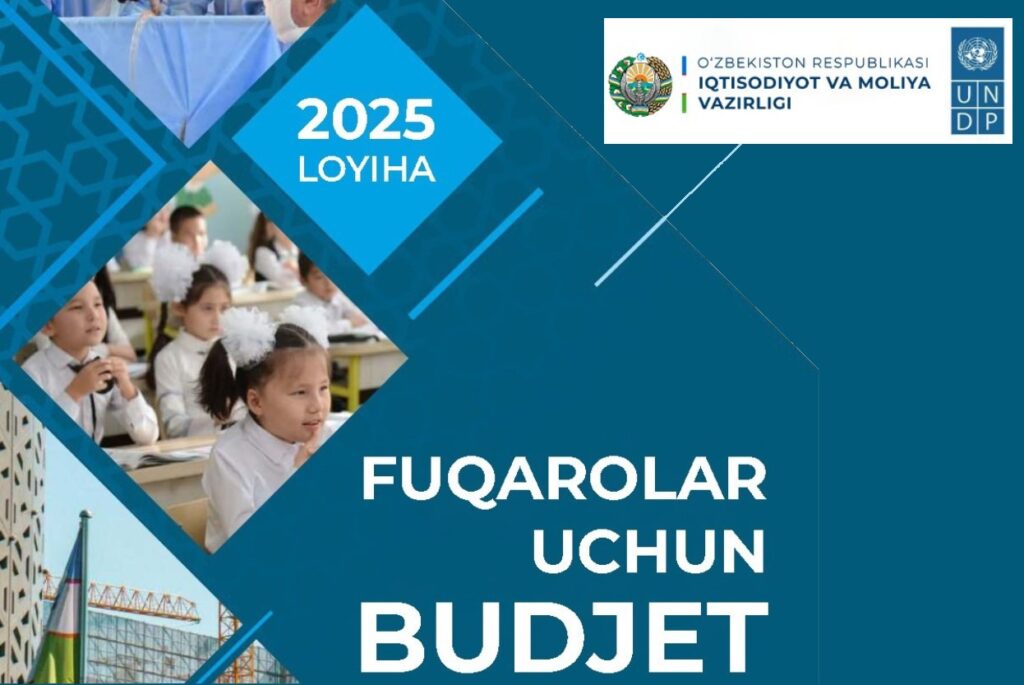
The Ministry of Economy and Finance published the information publication “Budget for Citizens” about the Draft State Budget of the Republic of Uzbekistan for 2025.
The document describes the content of the budget for the year – its formation and expenditures, as well as the economic prospects of Uzbekistan.
It should be noted that “Budget for Citizens” has been published since 2018, as part of the program of implementation of the joint project of the United Nations Development Program (UNDP) and the Ministry of Economy and Finance of the Republic of Uzbekistan “Financing Sustainable Development in Uzbekistan”.
Analysts of the Ministry of Economy and Finance of Uzbekistan expect that in 2025 the GDP growth rate will remain at the level expected at the end of this year – 6%. Then a slight acceleration is expected – to 6.1% in 2026 and 6.3% in 2027.
The main growth drivers for next year will be the service sector (14.5%) and construction (14.2%). At the same time, in 2026 the growth rate in the service industry will increase slightly (up to 15%), while in the construction industry it will decline (10.2%).
Value added in industry will grow by about 6% per year after 6.9% this year. Agriculture is expected to grow steadily by 4.1% for 2025 and then increase to 4.2%.
Inflation will be around 9% by the end of this year, up slightly from last year’s 8.8%. Next year it will slow down to 7%, and the target 5% will be reached no later than 2027.
Foreign trade turnover in 2025 will rise to $71.2 bln (+6%), with the trade deficit shrinking slightly to $10.4 bln. A year later, the Ministry of Economic Development expects foreign trade to increase to $76.5 bln and the deficit to shrink to $8.8 bln.
The forecast of budget revenues equals 308.54 trillion soums (19% of GDP) and exceeds the expected figure for this year by 13.8%. Taking into account revenues to trust funds, the figure will reach 375.06 trillion soums (+15.2%).
Indirect taxes will remain the largest source of government revenues. The expected amount of revenues will amount to 104.67 trillion soums (+16.5%).
VAT will account for more than two thirds of this amount – 71.83 trillion soums (+18.3%). The increase in payments will be ensured by the abolition of a number of privileges, changes in tariffs for energy resources, as well as general economic growth and increased collection rate.
Excise tax revenues will amount to 21.36 trillion soums (+16.5%), of which slightly more than half will be on gas (6.21 trillion soums), gasoline and diesel fuel (5.5 trillion soums). Revenues from sugar-containing beverages are expected to grow by 81% to 1.15 trillion soums.
Direct taxes will bring 100.26 trillion soums (+14.6%) to the budget, of which business profit tax will account for 54.75 trillion soums (+11.9%). PIT payments will amount to another 41.99 trillion soums, increasing by 17.9% due to the growth of wages and their removal from the shadow.
The MEF also expects to receive 38.69 trillion soums (+7.5%) in resource taxes, including 20.65 trillion soums (+3%) in subsoil use tax.
Non-tax revenues will account for 64.9 trillion soums (+12.4%). This includes revenues from privatization, dividends from state shares in enterprises, state duties, fees, fines, etc.
The volume of planned expenditures for 2025 is 344.6 trillion soums – 8.5% more than expected this year, while their share of GDP will decrease from 22.5% to 21.1%. Expenditures of the budget and trust funds amount to 407.4 trillion soums (+10.1%).
Slightly more than half of the expenditures (178.2 trillion soums) will be allocated to the social sphere. It is planned to allocate 84 trillion soums for education, 41 trillion soums for medicine. Another 36 trillion soums will be allocated for allowances, compensations, as well as transfers to the Pension Fund.
In particular, it is planned to spend 3.8 trillion soums (+14.7%) on subsidies for private kindergartens. At the same time, the average cost per pupil will be reduced to 3.124 million soums.
Spending on the needs of the national economy will amount to 39.2 trillion soums. Almost a third of this amount is subsidies for natural gas (7 trillion soums), electricity (500 billion soums) and heating (4.84 trillion soums). The Trade Support Fund will receive 714 billion soums.
Another 27.4 trillion soums will be allocated for infrastructure development. In particular, 1 trillion soums will be allocated for the integrated development of 15 selected districts and cities.
The deficit of the consolidated budget in 2025 will amount to 49.26 trillion soums, decreasing by 13.9% against the current one. It is then expected to rise to 55.5 trillion soums in 2026 and 64.1 trillion soums in 2027, while remaining at 3% of GDP.
Total government debt will reach $39.7 billion (35.5% of GDP) or $4.8 billion more than last year. By the end of 2025, it may exceed $45 bln (36.7% of GDP), of which $39.4 bln will be external debt.
Next year it is planned to attract foreign borrowings for $5.5 billion, of which $3 billion will be used to ensure budget fulfillment. The cost of servicing the state debt is estimated at 21.1 trillion soums.